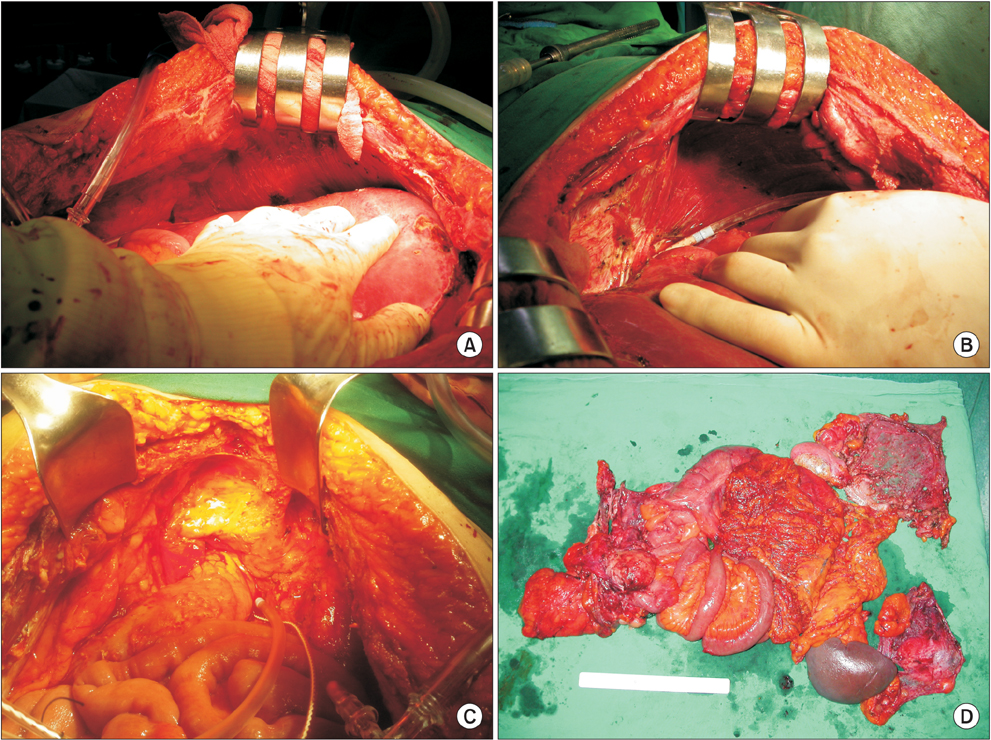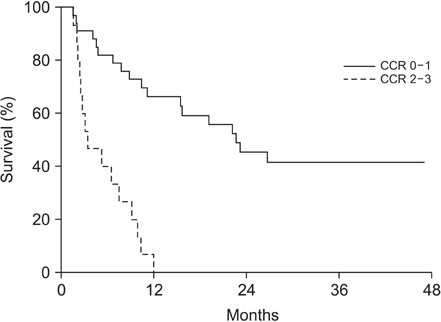Ann Surg Treat Res.
2016 Oct;91(4):157-164. 10.4174/astr.2016.91.4.157.
Cytoreductive surgery and intraperitoneal chemotherapy for peritoneal carcinomatosis of colorectal cancer: 2-year follow-up results at a single institution in Korea
- Affiliations
-
- 1Department of Surgery, Dankook University College of Medicine, Cheonan, Korea. dkpark@dankook.ac.kr
- KMID: 2354322
- DOI: http://doi.org/10.4174/astr.2016.91.4.157
Abstract
- PURPOSE
The purpose of this study was to examine 2-year follow-up results of cytoreductive surgery (CRS) and intraperitoneal chemotherapy (IPC) for peritoneal carcinomatosis (PC) of colorectal cancer.
METHODS
We performed 54 cases of CRS and IPC in 53 patients with PC of colorectal cancer from December 2011 to December 2013. We collected data prospectively and analyzed the grade of PC, morbidity and mortality, and short-term follow-up (median, 10 months; range, 2-47 months) results.
RESULTS
Mean peritoneal cancer index (PCI) was 15 (range, 1-35), and complete cytoreduction was possible in 35 patients (64.8%). Complications occurred in 25 patients (46.3%) and mortality occurred in 4 patients (7.4%). Excluding the 4 mortalities, 17 patients out of 49 patients (31.5%) were alive at the time of the last follow-up and the overall median survival was 10.3 months. Patients with complete cytoreduction had a median survival of 22.6 months, which was significantly longer than the median survival of 3.5 months for patients without complete cytoreduction (P < 0.001). PCI grade, CCR grade, cell type, and postoperative chemotherapy were significant prognostic factors by univariate analysis. Positive independent prognostic factors by multivariate analysis included PCI grade and postoperative chemotherapy.
CONCLUSION
CRS and IPC increased the survival of patients with low PCI and postoperative systemic chemotherapy was mandatory. However, this combined therapeutic approach showed high rate of complications and mortality. Therefore, this aggressive treatment should be performed in only selected patients by considering the general condition of the patient and the extent of PC.
Keyword
MeSH Terms
Figure
Cited by 2 articles
-
Cytoreductive Surgery and Hyperthermic Intraperitoneal Chemotherapy as Treatment Options for Peritoneal Metastasis of Advanced Gastric Cancer
Dong-Wook Kim, Dong-Guk Park, Sanghyun Song, Ye Seob Jee
J Gastric Cancer. 2018;18(3):296-304. doi: 10.5230/jgc.2018.18.e32.Treatment options for advanced gastric cancer with peritoneal metastasis: experience from a single institution in Korea
Dong-Wook Kim, Sang Il Youn, Ye Seob Jee
Ann Surg Treat Res. 2021;100(4):209-217. doi: 10.4174/astr.2021.100.4.209.
Reference
-
1. Lungoci C, Mironiuc AI, Muntean V, Oniu T, Leebmann H, Mayr M, et al. Multimodality treatment strategies have changed prognosis of peritoneal metastases. World J Gastrointest Oncol. 2016; 8:67–82.2. Mirnezami R, Mehta AM, Chandrakumaran K, Cecil T, Moran BJ, Carr N, et al. Cytoreductive surgery in combination with hyperthermic intraperitoneal chemotherapy improves survival in patients with colorectal peritoneal metastases compared with systemic chemotherapy alone. Br J Cancer. 2014; 111:1500–1508.3. Weber T, Roitman M, Link KH. Current status of cytoreductive surgery with hyperthermic intraperitoneal chemotherapy in patients with peritoneal carcinomatosis from colorectal cancer. Clin Colorectal Cancer. 2012; 11:167–176.4. Roviello F, Caruso S, Marrelli D, Pedrazzani C, Neri A, De Stefano A, et al. Treatment of peritoneal carcinomatosis with cytoreductive surgery and hyperthermic intraperitoneal chemotherapy: state of the art and future developments. Surg Oncol. 2011; 20:e38–e54.5. Jacquet P, Sugarbaker PH. Clinical research methodologies in diagnosis and staging of patients with peritoneal carcinomatosis. Cancer Treat Res. 1996; 82:359–374.6. Sugarbaker PH. Peritonectomy procedures. Ann Surg. 1995; 221:29–42.7. Cao C, Yan TD, Black D, Morris DL. A systematic review and meta-analysis of cytoreductive surgery with perioperative intraperitoneal chemotherapy for peritoneal carcinomatosis of colorectal origin. Ann Surg Oncol. 2009; 16:2152–2165.8. Esquivel J, Piso P, Verwaal V, Bachleitner-Hofmann T, Glehen O, González-Moreno S, et al. American Society of Peritoneal Surface Malignancies opinion statement on defining expectations from cytoreductive surgery and hyperthermic intraperitoneal chemotherapy in patients with colorectal cancer. J Surg Oncol. 2014; 110:777–778.9. Esquivel J, Sticca R, Sugarbaker P, Levine E, Yan TD, Alexander R, et al. Cytoreductive surgery and hyperthermic intraperitoneal chemotherapy in the management of peritoneal surface malignancies of colonic origin: a consensus statement. Society of Surgical Oncology. Ann Surg Oncol. 2007; 14:128–133.10. Glehen O, Kwiatkowski F, Sugarbaker PH, Elias D, Levine EA, De Simone M, et al. Cytoreductive surgery combined with perioperative intraperitoneal chemotherapy for the management of peritoneal carcinomatosis from colorectal cancer: a multi-institutional study. J Clin Oncol. 2004; 22:3284–3292.11. Elias D, Gilly F, Boutitie F, Quenet F, Bereder JM, Mansvelt B, et al. Peritoneal colorectal carcinomatosis treated with surgery and perioperative intraperitoneal chemotherapy: retrospective analysis of 523 patients from a multicentric French study. J Clin Oncol. 2010; 28:63–68.12. Cavaliere F, De Simone M, Virzì S, Deraco M, Rossi CR, Garofalo A, et al. Prognostic factors and oncologic outcome in 146 patients with colorectal peritoneal carcinomatosis treated with cytoreductive surgery combined with hyperthermic intraperitoneal chemotherapy: Italian multicenter study S.I.T.I.L.O. Eur J Surg Oncol. 2011; 37:148–154.13. Verwaal VJ, van Ruth S, de Bree E, van Sloothen GW, van Tinteren H, Boot H, et al. Randomized trial of cytoreduction and hyperthermic intraperitoneal chemotherapy versus systemic chemotherapy and palliative surgery in patients with peritoneal carcinomatosis of colorectal cancer. J Clin Oncol. 2003; 21:3737–3743.14. Verwaal VJ, Bruin S, Boot H, van Slooten G, van Tinteren H. 8-year follow-up of randomized trial: cytoreduction and hyperthermic intraperitoneal chemotherapy versus systemic chemotherapy in patients with peritoneal carcinomatosis of colorectal cancer. Ann Surg Oncol. 2008; 15:2426–2432.15. Franko J, Ibrahim Z, Gusani NJ, Holtzman MP, Bartlett DL, Zeh HJ 3rd. Cytoreductive surgery and hyperthermic intraperitoneal chemoperfusion versus systemic chemotherapy alone for colorectal peritoneal carcinomatosis. Cancer. 2010; 116:3756–3762.16. Chua TC, Morris DL, Saxena A, Esquivel J, Liauw W, Doerfer J, et al. Influence of modern systemic therapies as adjunct to cytoreduction and perioperative intraperitoneal chemotherapy for patients with colorectal peritoneal carcinomatosis: a multicenter study. Ann Surg Oncol. 2011; 18:1560–1567.17. Chua TC, Yan TD, Saxena A, Morris DL. Should the treatment of peritoneal carcinomatosis by cytoreductive surgery and hyperthermic intraperitoneal chemotherapy still be regarded as a highly morbid procedure?: a systematic review of morbidity and mortality. Ann Surg. 2009; 249:900–907.18. Canda AE, Sokmen S, Terzi C, Arslan C, Oztop I, Karabulut B, et al. Complications and toxicities after cytoreductive surgery and hyperthermic intraperitoneal chemotherapy. Ann Surg Oncol. 2013; 20:1082–1087.19. Turaga K, Levine E, Barone R, Sticca R, Petrelli N, Lambert L, et al. Consensus guidelines from The American Society of Peritoneal Surface Malignancies on standardizing the delivery of hyperthermic intraperitoneal chemotherapy (HIPEC) in colorectal cancer patients in the United States. Ann Surg Oncol. 2014; 21:1501–1505.20. Elias D, Benizri E, Di Pietrantonio D, Menegon P, Malka D, Raynard B. Comparison of two kinds of intraperitoneal chemotherapy following complete cytoreductive surgery of colorectal peritoneal carcinomatosis. Ann Surg Oncol. 2007; 14:509–514.21. Pfannenberg C, Königsrainer I, Aschoff P, Oksüz MO, Zieker D, Beckert S, et al. (18)F-FDG-PET/CT to select patients with peritoneal carcinomatosis for cytoreductive surgery and hyperthermic intraperitoneal chemotherapy. Ann Surg Oncol. 2009; 16:1295–1303.22. Lim JS, Kim MJ, Yun MJ, Oh YT, Kim JH, Hwang HS, et al. Comparison of CT and 18F-FDG pet for detecting peritoneal metastasis on the preoperative evaluation for gastric carcinoma. Korean J Radiol. 2006; 7:249–256.23. Kusamura S, Baratti D, Hutanu I, Rossi P, Deraco M. The importance of the learning curve and surveillance of surgical performance in peritoneal surface malignancy programs. Surg Oncol Clin N Am. 2012; 21:559–576.
- Full Text Links
- Actions
-
Cited
- CITED
-
- Close
- Share
- Similar articles
-
- Treatment of Peritoneal Carcinomatosis from Colorectal Cancer
- Recent Update on the Treatment of Colorectal Peritoneal Metastasis: A Surgical Perspective
- Combined Cytoreductive Surgery and Early Postoperative Intraperitoneal Chemotherapy for Peritoneal Carcinomatosis of Gastric Cancer
- Advances in the Treatment of Colorectal Cancer with Peritoneal Metastases: A Focus on Cytoreductive Surgery and Hyperthermic Intraperitoneal Chemotherapy
- Cytoreductive Surgery and Hyperthermic Intraperitoneal Chemotherapy With Mitomycin C Used for Colorectal Peritoneal Carcinomatosis





